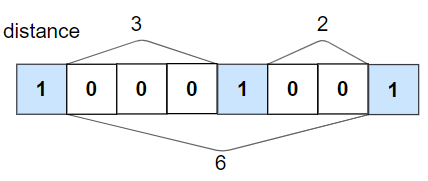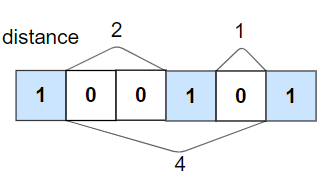Given an binary array nums and an integer k, return true if all 1's are at least k places away from each other, otherwise return false.
Example 1:
Input: nums = [1,0,0,0,1,0,0,1], k = 2 Output: true Explanation: Each of the 1s are at least 2 places away from each other.
Example 2:
Input: nums = [1,0,0,1,0,1], k = 2 Output: false Explanation: The second 1 and third 1 are only one apart from each other.
Constraints:
1 <= nums.length <= 1050 <= k <= nums.lengthnums[i]is0or1
class Solution:
def kLengthApart(self, nums: List[int], k: int) -> bool:
j = -1
for i, v in enumerate(nums):
if v == 1:
if j > -1 and i - j - 1 < k:
return False
j = i
return Trueclass Solution {
public boolean kLengthApart(int[] nums, int k) {
int j = -1;
for (int i = 0; i < nums.length; ++i) {
if (nums[i] == 1) {
if (j != -1 && i - j - 1 < k) {
return false;
}
j = i;
}
}
return true;
}
}class Solution {
public:
bool kLengthApart(vector<int>& nums, int k) {
int j = -1;
for (int i = 0; i < nums.size(); ++i) {
if (nums[i] == 1) {
if (j != -1 && i - j - 1 < k) {
return false;
}
j = i;
}
}
return true;
}
};func kLengthApart(nums []int, k int) bool {
j := -1
for i, v := range nums {
if v == 1 {
if j != -1 && i-j-1 < k {
return false
}
j = i
}
}
return true
}

